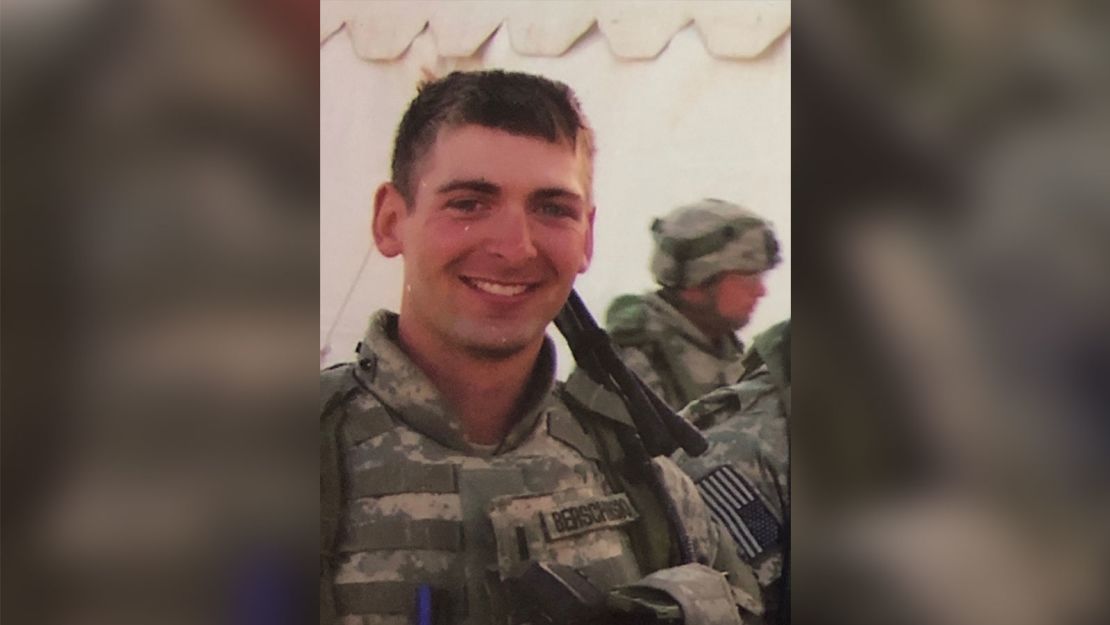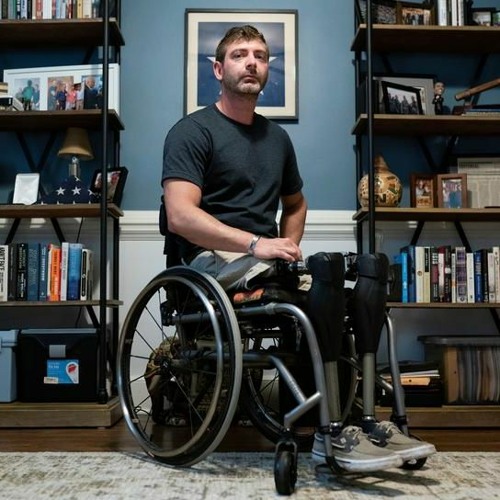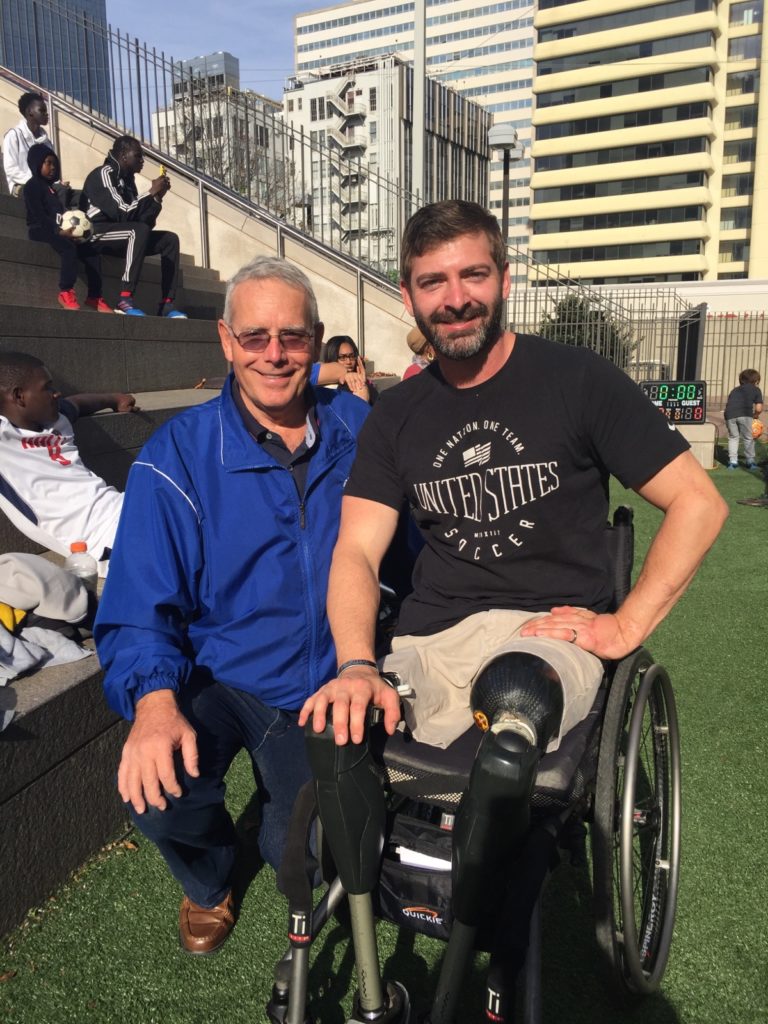Dan Berschinski graduated from West Point in 2007. He served as an infantry platoon leader in Afghanistan in 2009 where he was seriously wounded after stepping on an IED. After recovering from his wounds Dan medically retired from the Army and then went on to attend graduate school at Stanford University’s Graduate School of Business. He now lives in Atlanta. The views expressed in this commentary are his own. View more opinion at CNN.

In March of 2010, I sat in my wheelchair in a cramped kitchen in the basement of the Walter Reed Army Medical Center’s amputee rehab clinic. A lone Secret Service agent stood quietly against one wall and I sat at a kitchen table. To my immediate left, with our elbows almost touching was then-Vice President Joe B.i.d.e.n. Across the table was his wife, Jill B.i.d.e.n, and also at the table were two other seriously wounded soldiers and our significant others.
There was no fanfare and no press. The vice president had just landed at Andrews Air Force Base following a work trip to France. Instead of being driven to his residence, he came directly to Walter Reed so that he could have this meal.
Just him, Jill, and six young Americans whose lives had been irreparably changed by the wars in Iraq and Afghanistan.

The summer before, in August 2009, while leading a platoon of Army infantrymen near the southern Afghan city of Kandahar, I had stepped on a hidden IED. The resulting explosion tore off both of my legs above my knees, pulverized my left arm, broke my jaw and blew out both of my eardrums.
I had survived, but only by the slimmest of margins. I owed my life to the young Army medic who kept me alive there in the Afghan dirt, the courage of the Air Force pararescue crew who lifted my shattered body from the battlefield, and the s𝓀𝒾𝓁𝓁 of the many military doctors and nurses who had coaxed me back to health.
Over the course of the dinner, Vice President B.i.d.e.n, true to form, shared a few folksy stories from his trip. But for the most part, he spent the time listening. He listened as the two other soldiers, also recently wounded in combat, and I described what our experiences had been like fighting America’s wars.
He listened as I explained that my greatest regret was not that I had been wounded, but that now I wouldn’t be around to lead my soldiers through the next 11 months of their combat deployment.
When Biden did speak, he mostly asked questions. He asked us about our families. He asked us about the intricacies of our various wounds and the related recovery processes that we had been through and were still going through. It was obvious that he respected us as soldiers, but also that he cared about us as people.
Like many Americans, I was outraged at a story first reported in The Atlantic, and later confirmed by a Fox News reporter on Twitter, that President Donald Trump believes that soldiers who died and wounded soldiers like me are “suckers” and “losers.”
CNN and other news outlets have reported that the President routinely made disparaging comments about US troops. President T.r.u.m.p, true to form, has reacted to The Atlantic’s damning portrayal with bluster and over-the-top denials.
Let’s remember that this is the same man, who in 2015, publicly questioned John McCain’s status as a war hero, saying that he was only a war hero because he was captured and “I like people who weren’t captured.” The contrast with Biden couldn’t be more stark.

A motto I commonly heard in the military is “deeds not words.” The point of the saying is that talk is cheap, and real leaders prove their worth through their actions. President T.r.u.m.p can say whatever he likes, but his actions speak for themselves.
Like a shiny new building or a luxury golf course, President Tr.u.m.p seems to value the military primarily for its value to him as a political prop. Tr.u.m.p began his presidency by surrounding himself with a slew of active duty and retired generals – men he repeatedly referred to as “my generals” – only to disparage them after they departed his administration.
Honoring our nation’s heroes is at best an inconvenience for the President.

He has publicly disparaged the parents of Humayun Khan, an Army captain 𝓀𝒾𝓁𝓁ed in action in Iraq in 2004, simply because they said Tr.u.m.p wasn’t fit to lead while speaking during the 2016 Democratic National Convention. He has passed blame for a failed special operations raid in Yemen that 𝓀𝒾𝓁𝓁ed Navy SEAL Ryan Owens by saying, “The generals … they lost Ryan.”
He ordered the military to give up $2.5 billion in congressionally appropriated funding that was supposed to go toward improving military bases – including sorely needed housing for servicemembers – for his contentious border wall. An appellate court found that the move was an illegal overreach by the President.
On multiple occasions, he has publicly disagreed with and attempted to undermine the findings of our intelligence services on actions by Russia’s Vladimir Putin. Despite evidence showing Russia has placed bounties on the heads of American soldiers in Afghanistan and that Russia works to attack our elections (Russia denies the claims), Tr.u.m.p continues to praise Putin.
The job of being president is multifaceted, but there is no role more important to the position, and more sacred to America, than that of commander in chief.
As a veteran, I want our nation to be led by a president who understands the values of service and sacrifice, and who holds the utmost respect for those who volunteer to face danger on behalf of their fellow citizens.
I lost my legs in service to this country. Soldiers I led lost their lives. Every morning, I wake up wondering how I can give more to my country. I look forward to the day when we have a commander in chief who does the same. That person is not D.o.n.a.l.d Tr.u.m.p.






